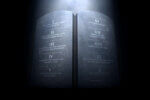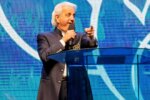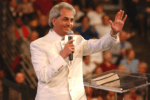David Brog
-

A Diplomatic Double Standard
 Earlier this month, Afghan President Hamid Karzai, lashed out at the United States. Although it is widely reported that Karzai won his re-election by fraud, he made the absurd claim that the international community was to blame for any voting irregularities. Though Karzai owes his power entirely to the U.S. and allied troops fighting the Taliban for him, he dared to criticize his defenders.
Earlier this month, Afghan President Hamid Karzai, lashed out at the United States. Although it is widely reported that Karzai won his re-election by fraud, he made the absurd claim that the international community was to blame for any voting irregularities. Though Karzai owes his power entirely to the U.S. and allied troops fighting the Taliban for him, he dared to criticize his defenders. -

How J Street Policy Took a Wrong Turn
 The founding of J Street in 2008 sparked much debate in the pro-Israel community. Many were concerned that the group would be overly critical of the Jewish state and thus erode the pro-Israel consensus in the United States.
The founding of J Street in 2008 sparked much debate in the pro-Israel community. Many were concerned that the group would be overly critical of the Jewish state and thus erode the pro-Israel consensus in the United States.Others and I disagreed and welcomed J Street's stated desire to "broaden the public and policy debate in the U.S. about the Middle East." It disturbed me that there were those who would seek to preclude any reasonable voice from competing in the marketplace of ideas.
-

Victory in the Senate
 Both houses of Congress have finally acted to employ the toughest economic sanctions at our disposal to stop Iran from going nuclear.
Both houses of Congress have finally acted to employ the toughest economic sanctions at our disposal to stop Iran from going nuclear.
Last Thursday, the U.S. Senate passed the Iran Sanctions, Accountability and Divestment Act, which combines Christians United for Israel's two top legislative priorities into one bill. -

New Year, Old Problems
 Missiles are fired from Gaza into southern Israel. Iran is steadily marching toward the production of nuclear weapons. And Hezbollah and Hamas are smuggling and stockpiling arms. Welcome to 2010. This may be a new year, but Israel's problems remain largely the same as last year's, and the year before.
Missiles are fired from Gaza into southern Israel. Iran is steadily marching toward the production of nuclear weapons. And Hezbollah and Hamas are smuggling and stockpiling arms. Welcome to 2010. This may be a new year, but Israel's problems remain largely the same as last year's, and the year before. The persistence of Israel's problems can tempt us toward two equally troubling reactions. The first reaction is to grow weary. There are no quick fixes in Israel. No easy answers. Who knew that standing with Israel would be so hard and take so long?
-
U.S. Urged to Place Sanctions on Iran
During the 2008 campaign, President Obama said he was willing to sit down for talks with Iran about its nuclear program "without preconditions." Given Iran's long record of delay when it comes to such negotiations, the president clarified early on in his administration that he would not wait indefinitely for Iran to come to the table and join the discussion. The president and our allies set September as the deadline for talks to begin.
When September arrived, Iran's President Mahmoud Ahmadinejad sounded a note of complete defiance. Taking a break from arresting and torturing his political opponents, Ahmadinejad declared "the nuclear issue is finished" and that "we will never negotiate on the Iranian nation's rights." Days later, Iran followed up by saying talks would be limited to a narrow list of topics of its own choosing. Notably absent from this list was its nuclear program.
-
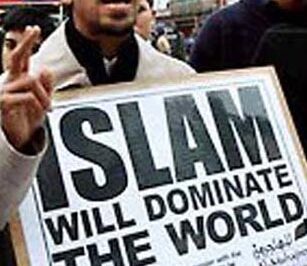
Will Zion Prevail?
 If ever there was a justification for despair and terrorism, the Holocaust provided it. After the Nazis and their allies systematically murdered 6 million Jews, it would have been easy for survivors to abandon their faith in God and humanity and succumb to hate. Yet the Jews who survived the Holocaust never sought revenge or destruction. They wanted only to get on with life, to build families, homes and cities.
If ever there was a justification for despair and terrorism, the Holocaust provided it. After the Nazis and their allies systematically murdered 6 million Jews, it would have been easy for survivors to abandon their faith in God and humanity and succumb to hate. Yet the Jews who survived the Holocaust never sought revenge or destruction. They wanted only to get on with life, to build families, homes and cities.This embrace of life characterizes Israel down to the present day. But those who wish to destroy Israel—and the Jewish people—remain. They have armed themselves and continue to attack. Meanwhile, the Israelis continue to build.
Every time I go to Israel I am struck by its progress. The Tel Aviv skyline continues to grow broader and push higher. An ever expanding list of Israeli companies churns out a steady stream of innovations that improve our daily lives. Israeli culture produces books, poetry and music at astounding rates.
-
What We Can Learn From Yad Vashem
In the hills outside of Jerusalem, the Israelis have built a memorial to the greatest tragedy in Jewish history, the Holocaust. This memorial, called Yad Vashem, houses a large and graphic exhibition detailing the murder of 6 million Jews. This display achieves its intended effect: it is impossible to walk through it and not be burdened by the enormity of the crime that the Nazis and their henchmen committed against the Jewish people. Visitors exit the hall carrying a heavy weight.
Outside the museum, nestled in a wooded campus, Yad Vashem hosts a more uplifting memorial: the Garden of the Righteous Among Nations. Here, scattered among the trees, are plaques in honor of the thousands of non-Jews who risked their lives to save Jews during the Holocaust. This part of Yad Vashem also impacts the visitor's state of mind. A detailed display of the depths of human cruelty ends, in this garden, on a note of hope.
-

Waking Up to Iran
In recent weeks, the world seems to have finally awakened to the true nature of Iran’s Islamic regime. First, Iran’s leaders appear to have stolen a presidential election on behalf of their preferred candidate, Mahmoud Ahmadinejad. Then they brutally cracked down on those who protested the theft. Rather than admit that the protests are an …
-
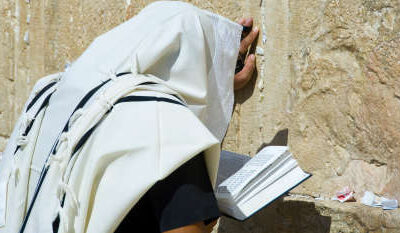
Did Obama Edit History?
 Even four weeks later, President Barak Obama's Cairo speech is still reverberating in Washington, D.C. To his credit, the president used the speech to shatter an ugly myth when he confronted Holocaust denial.
Even four weeks later, President Barak Obama's Cairo speech is still reverberating in Washington, D.C. To his credit, the president used the speech to shatter an ugly myth when he confronted Holocaust denial.But unfortunately, President Obama's speech actually reinforced other dangerous myths about Israel's history and the true obstacles to peace in the Middle East.
Last Sunday, Israeli Prime Minister Netanyahu stepped up to set the record straight. And last week, two Democratic senators—Sen. Harry Reid of Nevada and Sen. Robert Menendez of New Jersey—added their voices to the chorus of correction. Taking on a popular president from your own party is never easy. It is therefore of great significance that these two Democrats felt the need to clarify that when it comes to the specifics of the Arab-Israeli conflict, the president does not speak for the party.
-
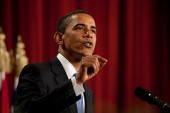
A Course Correction for President Obama
 Last week, President Obama gave a major speech in Cairo. There he made a number of important points, including issuing a strong rejection of Holocaust denial in front of an audience that has been far too sympathetic to it. Yet while confronting this one myth, President Obama unfortunately helped to perpetuate two other dangerous myths concerning Israel's right to exist and the roots of the Arab-Israeli conflict.
Last week, President Obama gave a major speech in Cairo. There he made a number of important points, including issuing a strong rejection of Holocaust denial in front of an audience that has been far too sympathetic to it. Yet while confronting this one myth, President Obama unfortunately helped to perpetuate two other dangerous myths concerning Israel's right to exist and the roots of the Arab-Israeli conflict.This week Israeli Prime Minister Benjamin Netanyahu gave what was, at least in part, his response. In a major policy speech at Bar Ilan University, Netanyahu not only set out his proposal for peace in the Middle East, but he provided a quick and cogent rebuttal to the two myths President Obama appeared to embrace in Cairo. It was good that he did so.
-
Constant Vigilance
The day before Holocaust Remembrance Day, Iran's President Ahmadinejad addressed the United Nations anti-racism conference in Geneva. Here, he did a great favor for all who love Israel—he was honest. He let his virulent hate for Israel and bizarre anti-Semitic conspiracy theories flow from his tongue largely unfiltered. It was an ugly performance.
The delegates from most European nations walked out on Ahmadinejad's speech. Even UN Secretary General Ban Ki-moon, was moved to criticism. Most other delegates, of course, remained in their seats. Many cheered.
But Ahmadinejad is rarely so honest. And he is rarely so helpful. It is what this man does in the shadows—not what he says in public—that is most dangerous. And what he does in the dark typically gets far less attention.
